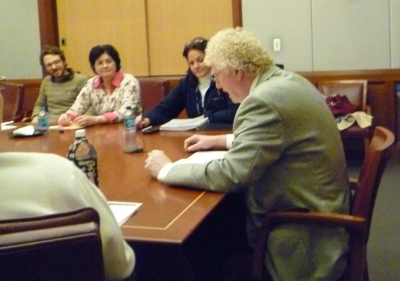|
|
Though firmly planted in the separate realms of art and science, literature and medicine become intrinsically connected when writers of fiction, essays, memoirs and poems make medicine their subject. Members of the current Literature and Medicine Reading Group at UMass Medical School’s Lamar Soutter Library are exploring those connections and what they mean.
Now in its ninth year at UMass Medical School, Literature and Medicine: Humanities at the Heart of Health Care is a national, award-winning, scholar-led humanities reading and discussion program for health care professionals. “It allows a different perspective on medicine, and helps to keep one focused on why we do what we do,” said returning participant Debra Papa, MD, assistant professor of obstetrics & gynecology. “It also helps keep me grounded and focused to deal with the stress of practicing medicine.”
Like Dr. Papa, Literature and Medicine participants at UMMS and across the nation report increased empathy for patients, improved interpersonal and communication skills and cultural awareness, even enhanced job satisfaction as a result of the program. The program likewise benefits its host institutions by giving diverse groups of health care professionals an opportunity to interact away from the often frantic pace of work, thereby enriching working relationships and strengthening their sense of common purpose.
Each session of the program, which meets once a month from January through June, explores a different specific theme, such as Through the Patient’s Eyes, Conflicts in the Workplace, Different Ways of Seeing, In the Grip of Addiction, All-too-human Healers, and Family Members: Caregivers and Witnesses. Open to all members of the UMass Memorial Health Care and UMMS community, the Literature and Medicine Reading Group this year includes five medical students, one Graduate School of Nursing student, an obstetrics resident, a gynecologist and two nurses, as well as a pathology researcher, two library associates and administrators from several departments.
“I like writing and thought this would be a good way to draw on both interests,” said first-year medical student Patrick Bonavitacola, who majored in religion as an undergraduate before turning to medicine. “I’ve been writing throughout this year, so seeing how other people write about different topics feels relevant for me.”
At the current group’s first meeting on Jan. 19, facilitator Patrick Ireland, PhD, chair and associate professor of English at the College of the Holy Cross, immediately set the tone with a lively account of his own family’s memorable experience with illness and medicine dating back to the 1918 flu pandemic. Encouraging participants to blend personal perspective with professional command of their subject matter, Dr. Ireland launched the group’s discussion with what will be the overarching question in the months to come: “What did we learn from this reading?”
First up was the posthumously published essay Hit by Lightning by the late journalist Marjorie Williams, in which she chronicled being diagnosed with liver cancer at age 43, and her sometimes surreal experiences as a terminally ill patient. The group’s conversation ranged from the differences between doctors and nurses, to the objectification of patients as scientific specimens, to what does and doesn’t help care givers and patients carry on in the face of illness and death.
“I enjoy the variety of perspectives that members with different backgrounds bring,” noted library staffer and former English teacher Harvey Fenigsohn. Fenigsohn has participated in the program each year since it was introduced to UMMS in 2003 through the efforts of co-liaisons David Hatem, MD, clinical associate professor of medicine, and Emily Ferrara, MA, in collaboration with the Massachusetts Foundation for the Humanities.
Ferrara is a published poet who was formerly the director of grants and academic initiatives in the Medical School’s Office of Educational Affairs, and is now a patient representative for UMass Memorial. Prior to leaving her position with the school, she transitioned administration of Literature and Medicine to the library to ensure its continuation. “I am grateful to Library Services Director Elaine Martin and her dedicated staff for their enthusiastic support of this valuable program,” said Ferrara. “My new role as patient representative has heightened my awareness of the value of medical humanities programs, such as this one, that offers health care professionals the opportunity for dialogue and reflection.”
